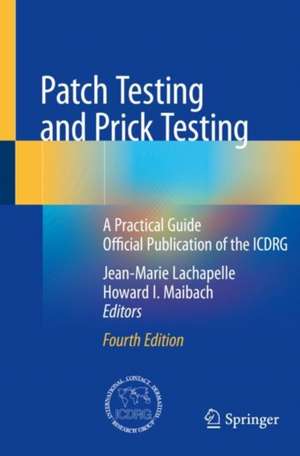Patch Testing and Prick Testing: A Practical Guide Official Publication of the ICDRG
Editat de Jean-Marie Lachapelle, Howard I. Maibachen Limba Engleză Paperback – 9 ian 2021
The fourth edition of this important book, which includes additional color illustrations, has been extensively revised, updated, and expanded to reflect the most recent developments. These include advances in patch testing methodology, in particular the new chambers that are appearing on the market, revision of the baseline series of patch tests to reflect the latest evidence-based work, and additional testing procedures. Other additions include sections on key allergens and concentrations, with the result is a superb guide to the current management of positive and negative patch test and prick test reactions that will be invaluable for all practicing dermatologists, from the beginner to the well-trained expert.
The fourth edition continues the tradition of partnering with the ICDRG (International Contact Dermatitis Research Group). The ICDRG was formed in 1966 to promote the understanding of contact dermatitis. It has had major roles in the standardization of patch testing and the facilitation of regular scientific meetings, for over forty years and thirty five years respectively. It has also been involved in the authorship of a number of publications on contact dermatitis. Both Drs. Maibach and Lachapelle are members and the ICDRG is now comprised of representatives from all over the world, and currently includes members from Belgium, Sweden, Denmark, the United Kingdom, USA, Germany, Singapore, Korea, India, Japan, Canada, Uruguay and Australia.
From the reviews of the previous editions:
"The aim is to balance brevity and clarity with sufficient details for beginners in the field of diagnostic patch and prick testing. … the book also will be of use to dermatology residents or anyone wishing to gain better knowledge of contact dermatitis. … There are many high-quality photographs and useful algorithms and tables. … It is clearly and concisely written and will serve asan indispensable guide for any dermatologist interested in contact dermatitis." (Renata H. Mullen, Doody’s Review Service, August, 2009)
| Toate formatele și edițiile | Preț | Express |
|---|---|---|
| Paperback (2) | 580.49 lei 38-44 zile | |
| Springer Berlin, Heidelberg – 23 aug 2016 | 580.49 lei 38-44 zile | |
| Springer International Publishing – 9 ian 2021 | 593.60 lei 38-44 zile | |
| Hardback (1) | 915.25 lei 3-5 săpt. | |
| Springer International Publishing – 19 dec 2019 | 915.25 lei 3-5 săpt. |
Preț: 593.60 lei
Preț vechi: 624.83 lei
-5% Nou
Puncte Express: 890
Preț estimativ în valută:
113.58€ • 118.60$ • 93.79£
113.58€ • 118.60$ • 93.79£
Carte tipărită la comandă
Livrare economică 11-17 aprilie
Preluare comenzi: 021 569.72.76
Specificații
ISBN-13: 9783030271015
ISBN-10: 3030271013
Pagini: 246
Ilustrații: XXII, 246 p. 98 illus., 93 illus. in color.
Dimensiuni: 155 x 235 x 16 mm
Greutate: 0.49 kg
Ediția:4th ed. 2020
Editura: Springer International Publishing
Colecția Springer
Locul publicării:Cham, Switzerland
ISBN-10: 3030271013
Pagini: 246
Ilustrații: XXII, 246 p. 98 illus., 93 illus. in color.
Dimensiuni: 155 x 235 x 16 mm
Greutate: 0.49 kg
Ediția:4th ed. 2020
Editura: Springer International Publishing
Colecția Springer
Locul publicării:Cham, Switzerland
Cuprins
Introductory Remarks.- Part I Patch Testing.- 1 Pathophysiology of Allergic and Irritant Contact Dermatitis.- 2 Diseases for Which Patch Testing Is Recommended: Patients Who Should Be Investigated.- 3 Patch Testing Methodology.- 4 Baseline Series of Patch Tests.- 5 Photopatch Testing.- 6 The T.R.U.E. Test® Methodology.- 7 Additional Testing Procedures and Spot Tests.- 8 Clinical Relevance of Patch Test Reactions.- 9 Atopic Dermatitis, Irritant Contact Dermatitis, and Allergic Contact Dermatitis.- 10 Spectrum of Diseases for Which Prick Testing and Open (Non-prick) Testing Are Recommended: Patients Who Should Be Investigated.- 11 Methodology of Open (Non-prick) Testing, Prick Testing, and Its Variants.- Part III Testing in Cutaneous Systemic Immune-Related Adverse Drug Reactions: Interest and Limitations.- 12 Testing Procedures in Cutaneous Systemic Immune-Related Adverse Drug Reactions.- Appendices.- Appendix A: Additional Series of Patch Tests.- Appendix B: The InternationalContact Dermatitis Research Group.- Appendix C: A List of Companies Producing and/or Distributing Patch and/or Prick Test Materials and/or Allergens.
Notă biografică
Jean-Marie Lachapelle is Professor Emeritus in the Department of Dermatology at Université Catholique de Louvain in Belgium. He is one of the foremost experts in patch testing and contact dermatitis.
Caracteristici
Extensively revised, updated, and expanded edition that reflects recent advances and includes more color illustrations Updates include advances in patch testing methodology, in particular the new chambers that are appearing on the market, revision of the baseline series of patch tests to reflect the latest evidence-based work, and sections on key allergens and concentrations Discusses the management of positive and negative patch test and prick test reactions Invaluable for all practicing dermatologists, from the beginner to the well-trained expert
Textul de pe ultima copertă
Knowledge in the field of allergic contact dermatitis continues to expand rapidly owing to progress in the chemical, immunological, and clinical fields, including improved techniques of patch testing and prick testing. The third edition of this important book, which includes additional color illustrations, has been extensively revised, updated, and expanded to reflect the most recent developments. These include advances in patch testing methodology, in particular the new chambers that are appearing on the market, revision of the baseline series of patch tests to reflect the latest evidence-based work, and additional testing procedures. The result is a superb guide to the current management of positive and negative patch test and prick test reactions that will be invaluable for all practicing dermatologists, from the beginner to the well-trained expert.
